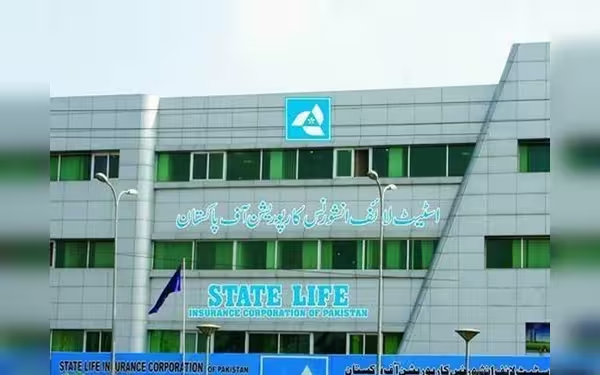Saturday, November 16, 2024 07:55 PM
NA Panel Approves 20% Stake Sale in SLIC for Welfare Transformation
- 20% stake sale in SLIC approved by NA committee.
- Proposal to convert SLIC into a welfare entity.
- Focus on insurance for crops and livestock.
 Image Credits: brecorder
Image Credits: brecorderNA committee approves 20% stake sale in SLIC, proposing its transformation into a welfare entity focused on agricultural insurance.
In a significant development for the State Life Insurance Corporation of Pakistan (SLIC), the National Assembly Standing Committee on Commerce has approved the divestment of 20 percent of its shares. This decision comes with a proposal to transform SLIC into a welfare entity, focusing on providing insurance for crops and livestock. The committee, led by MNA Jawed Hanif Khan, aims to enhance the role of SLIC in supporting the agricultural sector and improving the livelihoods of farmers.
The committee's meeting highlighted the need for SLIC to adapt to the changing economic landscape. The Chief Executive Officer (CEO) of SLIC presented a detailed overview of the corporation's financial health, revealing that in 2023, the government received a cash dividend of Rs 2.50 billion. Additionally, the retained profit for capital increase stood at Rs 2.21 billion, showcasing the corporation's robust financial performance. However, it was emphasized that only 20 percent of SLIC's stake will be divested in this transaction, as clarified by Secretary Commerce Jawad Pal.
During the discussions, MNA Dr. Mirza Ikhtiar Baig proposed that SLIC should initiate insurance for crops and livestock, thereby converting itself into a welfare organization. This move is expected to benefit middle and upper-middle-income groups, providing them with essential coverage in times of need. The committee members expressed their willingness to assist in amending the rules governing SLIC to facilitate this transition.
Moreover, the committee recognized the cumbersome procedures currently associated with insurance companies. There is a pressing need to simplify these processes to make insurance more accessible to the general public. The CEO of SLIC indicated that, based on the Board of Directors' directives, the management will explore the feasibility of establishing various new ventures, including an asset management company and a digital software house, over the next year.
Another critical issue raised was the impact of provincial sales tax on life insurance premiums, which is adversely affecting policyholders and overall market penetration. The CEO pointed out that insurance contributes only 0.6 percent to Pakistan's GDP, significantly lower than the global average of 2.8 percent. This statistic underscores the vast untapped market potential for insurance in the country.
Special Secretary Commerce noted that the culture of insurance coverage in Pakistan is minimal, citing instances where government buildings in Sindh have suffered multiple fires without any insurance coverage. This lack of awareness and coverage is a significant barrier to the growth of the insurance sector.
Additionally, the committee raised concerns about private sector insurance companies that are profiting without adequately sharing benefits with policyholders. The committee was also briefed on the functions and performance of the Directorate General Trade Organizations (DGTO), with suggestions made to enhance its budget to improve performance.
The proposed changes to SLIC and the insurance landscape in Pakistan represent a crucial step towards enhancing financial security for citizens, particularly in the agricultural sector. By transforming SLIC into a welfare entity and simplifying insurance processes, the government aims to foster a culture of insurance coverage that can significantly benefit the economy and the lives of ordinary people. As these discussions progress, it will be essential to monitor the implementation of these proposals and their impact on the insurance sector and the broader economy.













